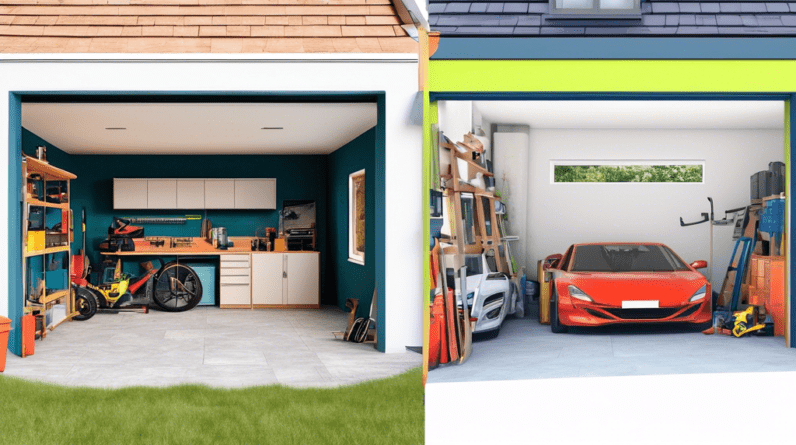
Planning a garage conversion? Before diving headfirst into this exciting home improvement project, it’s crucial to have a realistic grasp on the potential costs involved. That’s where a garage conversion cost calculator comes in handy.
What is a Garage Conversion Cost Calculator?
A garage conversion cost calculator is an online tool that provides an estimated cost for converting your garage into a living space. This handy tool considers various factors specific to your project, such as:
- Location
- Size of the garage
- Desired features (bathroom, kitchen, etc.)
- Quality of materials
- Labor costs in your area
By inputting your project details, the calculator generates an estimated cost range, giving you a clearer picture of the potential financial commitment.
Why Use a Garage Conversion Cost Calculator?
While not a substitute for a detailed quote from a contractor, a garage conversion cost calculator offers several benefits:
- Early Budget Planning: Get a preliminary idea of the costs involved before committing to the project, allowing for early budget adjustments and financial planning.
- Project Scope Refinement: Experiment with different features and materials to see how they impact the overall cost, helping you refine your project scope within budget constraints.
- Informed Decision Making: Compare different conversion options and make informed decisions based on your budget and desired outcomes.
- Time-Saving: Quickly obtain a cost estimate without the need for multiple contractor consultations in the initial planning stages.
How to Use a Garage Conversion Cost Calculator: A Step-by-Step Guide
Using a garage conversion cost calculator is typically straightforward. Here’s a general step-by-step guide:
Step 1: Choose a Reputable Garage Conversion Cost Calculator
Start by selecting a reliable online calculator from a reputable source. Look for calculators offered by home improvement websites, construction companies, or financial institutions. Ensure the calculator is specific to garage conversions in your country or region to ensure accuracy.
Step 2: Input Your Project Location
The cost of construction materials and labor varies by location. Most calculators will ask for your zip code or region to provide localized cost estimates.
Step 3: Specify the Size of Your Garage
Provide the calculator with accurate measurements of your garage, including length, width, and ceiling height. This information helps determine the square footage and volume of the space, directly impacting material and labor costs.
Step 4: Select Your Desired Features and Finishes
This is where you can customize your conversion. Indicate whether you want to add a bathroom, kitchenette, or full kitchen. Specify your preferences for flooring, insulation, drywall, windows, doors, and lighting fixtures. The calculator will factor in the cost of these additions and finishes.
Step 5: Choose a Quality Level
Most calculators allow you to select a quality level for your conversion, such as basic, standard, or high-end. This selection influences the cost of materials and the level of craftsmanship used during the project.
Step 6: Review and Adjust
Once you’ve inputted all the necessary information, the calculator will generate an estimated cost range for your garage conversion. Take time to review the breakdown of costs, including materials, labor, permits, and potential contingencies. If the estimate falls outside your budget, adjust the features, finishes, or quality level until you reach a more manageable figure.
Understanding the Cost Breakdown
A detailed garage conversion cost calculator will typically provide a breakdown of the estimated expenses. Here are some common cost factors to consider:
1. Design Fees
If you’re planning a complex conversion or need assistance with design plans, you might need to factor in architectural or design fees. These fees vary depending on the scope of the project and the professional’s experience.
2. Permits and Inspections
Most garage conversions require building permits and inspections to ensure compliance with local building codes. The cost of permits varies by location and project complexity.
3. Foundation Work
Depending on the condition of your existing garage foundation, you might need to invest in repairs or reinforcement. This cost is influenced by factors such as soil conditions and the extent of work required.
4. Framing and Insulation
Framing out walls, adding insulation, and installing drywall are essential components of a garage conversion. The cost depends on the size of the space and the type of insulation chosen.
5. Electrical and Plumbing
Adding electrical outlets, lighting fixtures, and potentially plumbing for a bathroom or kitchenette can significantly impact the overall cost. The complexity of the electrical and plumbing work depends on your chosen features.
6. HVAC
Extending or modifying your existing HVAC system to ensure comfortable temperatures in the converted space is crucial. The cost depends on the size of the space and the type of HVAC system installed.
7. Flooring, Walls, and Ceiling
The cost of finishing materials like flooring, paint, trim, and ceiling finishes can vary widely depending on your preferences and the quality of materials chosen.
8. Doors and Windows
Replacing the garage door with a wall and installing windows and doors are essential aspects of a conversion. The cost depends on the size, style, and energy efficiency of the chosen fixtures.
9. Labor Costs
Labor costs constitute a significant portion of the total conversion expenses. The rates vary depending on your location, the complexity of the project, and the experience level of the contractors involved.
Tips for Maximizing Your Budget
Here are some helpful tips to keep in mind when using a garage conversion cost calculator and planning your project:
1. Start with a Realistic Budget
Determine how much you can realistically afford to spend on the conversion and stick to your budget throughout the planning process.
2. Prioritize Essential Features
Focus on the essential features that add value and functionality to your new living space. Consider adding non-essential features later as your budget allows.
3. Explore Cost-Effective Alternatives
Discuss cost-effective alternatives with your contractor, such as using reclaimed materials or choosing standard finishes over high-end options.
4. Get Multiple Quotes
Once you have a good understanding of the estimated costs, obtain detailed quotes from several reputable contractors to compare pricing and services.
5. Factor in Contingencies
It’s wise to set aside a contingency fund (around 10-20% of the total estimated cost) to cover unexpected expenses that may arise during the construction process.
Conclusion
Embarking on a garage conversion can be an excellent way to add valuable living space to your home. By utilizing a garage conversion cost calculator and carefully considering the factors outlined in this guide, you can approach the project with greater confidence and financial preparedness. Remember that the calculator provides an estimated cost range, and it’s crucial to consult with qualified professionals for accurate quotes and expert guidance throughout the entire conversion process.






